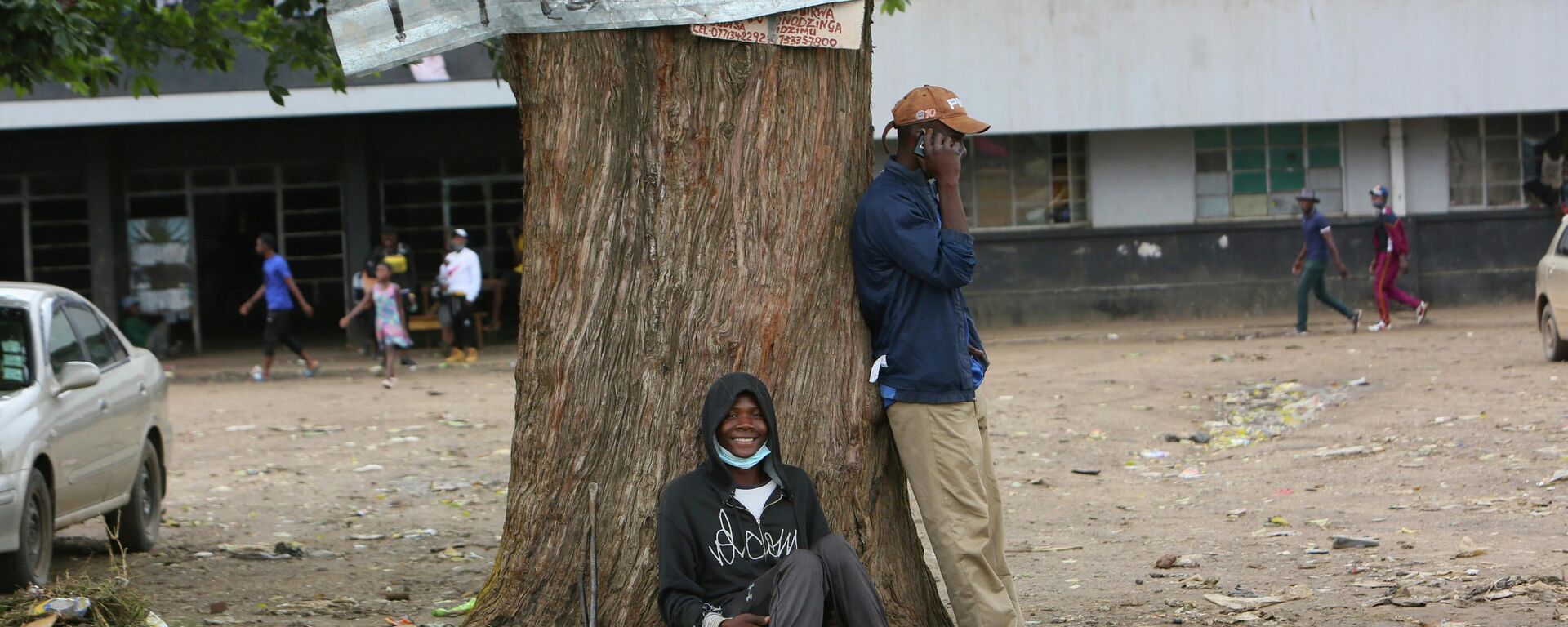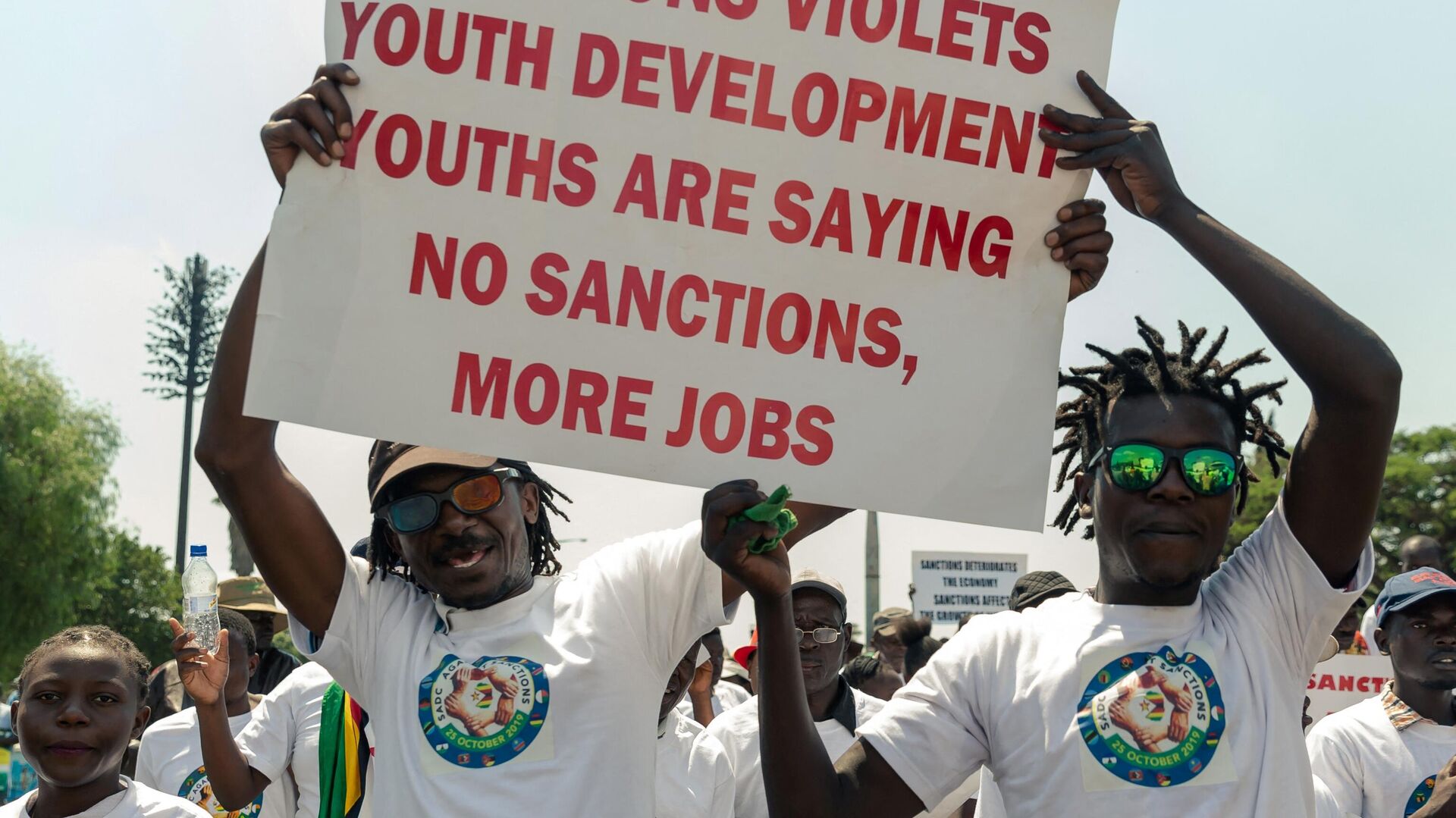https://sputnikglobe.com/20230301/eu-extends-anti-zimbabwe-sanctions-1107905045.html
EU Extends Anti-Zimbabwe Sanctions
EU Extends Anti-Zimbabwe Sanctions
Sputnik International
The European Union (EU) has decided to maintain remaining economic sanctions imposed against Zimbabwe for another year, the EU's High Representative Josep Borrell says in a February 28 statement.
2023-03-01T15:15+0000
2023-03-01T15:15+0000
2023-03-01T15:15+0000
africa
southern africa
zimbabwe
european union (eu)
josep borrell
economic sanctions
land reform
https://cdn1.img.sputnikglobe.com/img/07e7/03/01/1107899667_0:321:3071:2048_1920x0_80_0_0_a980f3bba344e04c4f09cc8554885d13.jpg
The European Union (EU) has decided to maintain remaining economic sanctions imposed against Zimbabwe for another year, the EU's high representative, Josep Borrell, said in a February 28 statement.The EU claimed the sanctions do not constrain the country economically, saying Zimbabwe benefits from EU financial support and duty-free access to its market.However, the African country's difficulties, including hyperinflation, high unemployment, agricultural decline, etc., are largely attributed to the unilateral sanctions imposed by the EU and US at the beginning of the 21st century.Moreover, these measures have been repeatedly slammed by officials of African countries as well as by states on other continents.In 2022, the UN Human Rights Council issued a report on the sanctioned economy of Zimbabwe, emphasizing the damaging impact of the sanctions.Among the opponents of the sanctions also is South Africa's President Cyril Ramaphosa, according to whom the West's punitive measures are harming the economies of the Southern African Development Community (SADC).Although the EU claims the sanctions do not constrain the economy of the Southern African nation, the Geneva-based SADC permanent mission's report on the impact of the unilaterally imposed sanctions says the opposite.Since the sanctions were imposed, Zimbabwe's economy has suffered dramatic losses, according to the report.Countries outside Africa have also supported Zimbabwe in its struggle to lift the sanctions; for instance, in 2008, Russia and China vetoed a UN Security Council resolution on sanctions against the African state.Moreover, in 2019, Russian Natural Resources and Environment Minister Dmitry Kobylkin reaffirmed the position of Russia in the context of the sanctions, saying Moscow advocates strongly against them.Initially, the sanctions were imposed amid Zimbabwe's deteriorated relations with the EU and US after Robert Mugabe's 2000 land reform adopted in an effort to erase the colonial legacy of the country by redistributing land from white farmers to indigenous Zimbabweans. In line with the sanctions, it has been prohibited to have commercial dealings with people or entities which are on the "sanctioned list."Since then, the restrictive measures have been maintained and revised by Western powers.
https://sputnikglobe.com/20221110/the-developing-countries-that-still-struggle-under-the-yoke-of-western-sanctions-1103865745.html
africa
southern africa
zimbabwe
Sputnik International
feedback@sputniknews.com
+74956456601
MIA „Rossiya Segodnya“
2023
News
en_EN
Sputnik International
feedback@sputniknews.com
+74956456601
MIA „Rossiya Segodnya“
Sputnik International
feedback@sputniknews.com
+74956456601
MIA „Rossiya Segodnya“
eu, us, zimbabwe, economic sanctions, damaging impact, ramaphosa, mugabe, economy, land reform
eu, us, zimbabwe, economic sanctions, damaging impact, ramaphosa, mugabe, economy, land reform
EU Extends Anti-Zimbabwe Sanctions
It has been more than 20 years that Zimbabwe has been experiencing Western pressure in the form of economic sanctions that were unilaterally imposed at the beginning of the 21st century. Despite the West's claims that the sanctions deal no damage to the economy of Zimbabwe, many experts and politicians say the opposite.
The European Union (EU) has decided to maintain remaining economic sanctions imposed against Zimbabwe for another year, the EU's high representative, Josep Borrell, said in a February 28 statement.
"In its 2023 revision of the restrictive measures, the EU has decided to extend by one year the two measures in place (i.e. the arms embargo and targeted assets freeze against one company, Zimbabwe Defense Industries)," Borrell declared.
The EU claimed the sanctions do not constrain the country economically, saying Zimbabwe benefits from EU financial support and duty-free access to its market.
However, the African country's difficulties, including hyperinflation, high unemployment, agricultural decline, etc., are largely attributed to the unilateral sanctions imposed by the EU and US at the beginning of the 21st century.
Moreover, these measures have been repeatedly slammed by officials of African countries as well as by states on other continents.
In 2022, the UN Human Rights Council issued a report on the sanctioned economy of Zimbabwe,
emphasizing the damaging impact of the sanctions.
"Unilateral sanctions decimated the economic performance of the country, thereby aggravating the humanitarian situation and consequently adversely impacting access to basic rights, including to life, food, water and sanitation, health and education, and the rights of Zimbabwean residents, migrants and refugees…" the report said.
Among the opponents of the sanctions also
is South Africa's President Cyril Ramaphosa, according to whom the West's punitive measures are harming the economies of the Southern African Development Community (SADC).
"They are also having a negative impact on us because as the sanctions weaken Zimbabwe’s economy, Zimbabweans are forced to migrate and to come to our own country and other countries in the sub-region," he said, adding: "they flock to Botswana, they flock to South Africa, to Namibia and they exert enormous pressure on us."
Although the EU claims the sanctions do not constrain the economy of the Southern African nation, the Geneva-based SADC permanent mission's report on the impact of the unilaterally imposed sanctions
says the opposite.
Since the sanctions were imposed, Zimbabwe's economy has suffered dramatic losses, according to the report.
"Zimbabwe has lost well over $42 billion in revenue over the past nineteen years because of the sanctions. This includes lost bilateral donor support estimated at $4.5 billion annually since 2001, $12 billion in loans from the International Monetary Fund, the World Bank and African Development Bank, commercial loans of $18 billion and a GDP reduction of $21 billion," the report reads.

10 November 2022, 10:14 GMT
Countries outside Africa have also supported Zimbabwe in its struggle to lift the sanctions; for instance, in 2008, Russia and China
vetoed a UN Security Council resolution on sanctions against the African state.
Moreover, in 2019, Russian Natural Resources and Environment Minister Dmitry Kobylkin reaffirmed the position of Russia in the context of the sanctions, saying Moscow advocates strongly against them.
Initially, the sanctions
were imposed amid Zimbabwe's deteriorated relations with the EU and US after Robert Mugabe's 2000 land reform adopted in an effort to erase the colonial legacy of the country by redistributing land from white farmers to indigenous Zimbabweans. In line with the sanctions, it has been prohibited to have commercial dealings with people or entities which are on the "sanctioned list."
Since then, the restrictive measures have been maintained and revised by Western powers.



